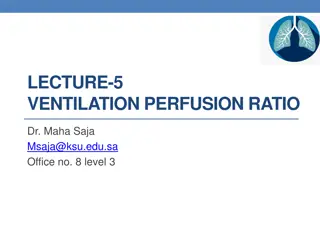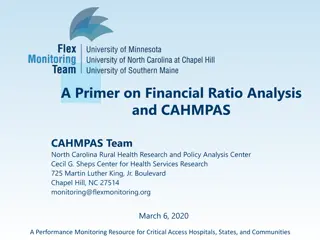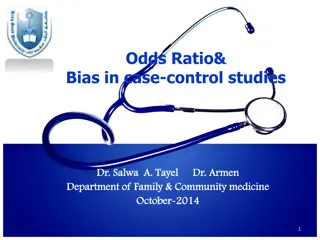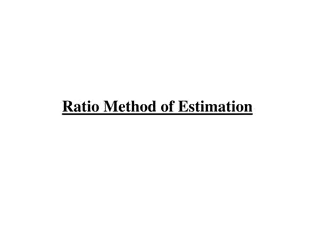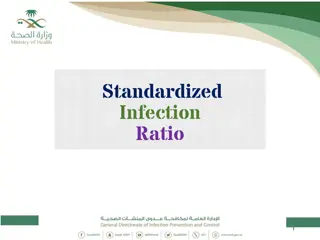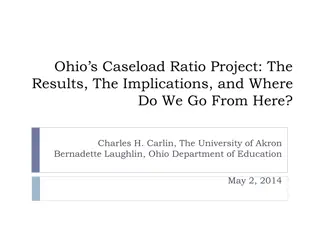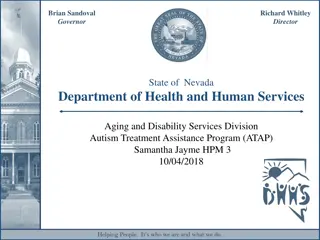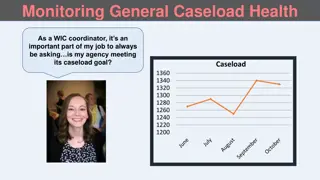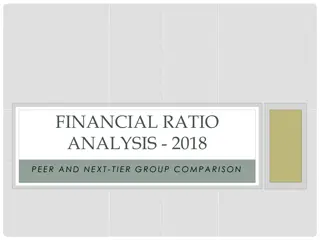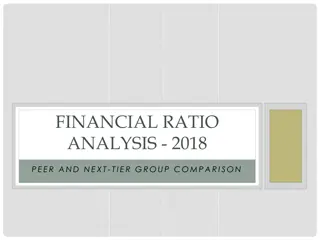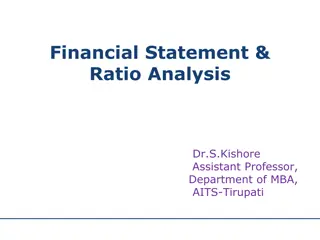Prioritizing Clinically Important Outcomes Using Hierarchical Win Ratio
Clinical trials often use composite outcomes, but conventional analysis methods have limitations in accurately reflecting clinical reality. Hierarchical outcomes offer flexibility by defining a hierarchy of events based on importance. Analyzing trials using hierarchical outcomes involves comparing p
7 views • 20 slides
Service Portal User Guide for Providers
Learn how to login to the service portal, navigate the site, manage your caseload, and create caseload groups effectively. Access important features like the service log, supervision log, reports, and resources to streamline your service provision process. Follow step-by-step instructions and utiliz
2 views • 15 slides
Strategic Digital Initiative Presentation for ECONUM Project
This presentation outlines the strategy and responsible approach for the digital transformation of the ECONUM project. It includes details on the project's objectives, mandatory requirements for project submission, contact information for organizing submission meetings, and key considerations for pr
10 views • 15 slides
Understanding Pulmonary Circulation and V/Q Ratio in Respiratory Physiology
Explore the high-pressure and low-pressure circulations supplying the lungs, the concept of physiological shunt in pulmonary circulation, different lung zones based on blood flow, V/Q ratio and its clinical significance, and abnormal V/Q ratio patterns. Delve into the role of pulmonary circulations
11 views • 28 slides
Healing Centered Engagement: Shifting Toward Collective Wellbeing
Collective healing and engagement approaches focus on addressing burnout, systemic oppression, and promoting desired wellbeing through identity restoration. By valuing lived experiences and promoting diversity, equity, and inclusion in policy and practice, these strategies aim to create a supportive
0 views • 7 slides
Enhancing Pediatric Endoscopy Services at Knox County
Knox Endoscopy, dedicated to pediatric endoscopy, faces a growing caseload demanding additional capacity. Existing facilities are at optimal utilization levels, prompting the proposal of a cost-effective Ambulatory Surgical Treatment Center (ASTC). The proposed ASTC is expected to be a more efficien
0 views • 9 slides
Understanding Fibonacci Sequence and the Golden Ratio
Fibonacci numbers are a sequence of numbers starting with 0, 1, where each number is the sum of the two preceding numbers. This sequence, discovered by Leonardo Fibonacci, displays a fascinating relationship to the Golden Ratio when examining the ratios of consecutive numbers. The Golden Ratio, appr
1 views • 55 slides
Understanding Ventilation-Perfusion Ratio in Pulmonary Circulation
This lecture delves into the intricate relationship between ventilation and perfusion in the lungs, highlighting the importance of proper gas exchange for optimal respiratory function. It discusses the circulations supplying the lungs, defines the V/Q ratio, and explores the clinical significance of
0 views • 25 slides
Converting Measurements using Ratio in Math Education
Explore the concept of converting measurements using ratio in Math education. Learn how to convert between customary and metric units through multiplication or division, and solve problems with ratio and proportion. Discover key vocabulary like Customary Unit, Metric Unit, Conversion, Ratio, and Pro
1 views • 23 slides
Household Food Support Programme in Liberia: Caseload Estimation and Targeting Approach
The Government of Liberia's COVID-19 Household Food Support Programme aims to assist those facing food insecurity in four target counties. Using data from various assessments, the programme estimates a caseload of 1,971,000 individuals. Targeting strategies include geographical and household-level c
0 views • 22 slides
Understanding Prioritization and Barriers to Care in Health Care Navigation Practice
In this session of the SSVF Health Care Navigator Community of Practice, participants discussed the anticipated caseload size, plan for prioritizing veterans for health care navigation services, messaging strategies, and additional resources for support. Barriers to care such as age, lack of support
0 views • 55 slides
A Primer on Financial Ratio Analysis and CAHMPAS
This resource by the CAHMPAS Financial Team at University of North Carolina provides an in-depth look into financial ratio analysis, including the theory, types of analyses, and the importance of understanding financial indicators. It discusses how businesses can assess their financial performance a
0 views • 87 slides
Evolution of the Ratio Formationis Generalis in Congregational Formation
Evolution and significance of the Ratio Formationis Generalis in Congregational Formation, from its historical development to the need for updates in response to changes in formation programs and Vatican documents. The formation of Units, Conferences, Directories, and Programs based on the Ratio, hi
4 views • 16 slides
Understanding Ratio Analysis in Financial Statements
Ratio analysis is a crucial process in interpreting financial statements by deriving accounting ratios from the balance sheet and profit and loss account. It involves assessing short-term liquidity, long-term solvency, activity ratios, and profitability ratios. Liquidity ratios like current ratio, q
2 views • 41 slides
Understanding Odds Ratio and Bias in Case-Control Studies
This educational material covers the essentials of odds ratio and bias in case-control studies, including how to construct a 2x2 table, calculate odds ratio, define bias, and interpret results. A specific case study on pesticide exposure and cancer is presented to illustrate these concepts. Readers
2 views • 20 slides
Efficient Estimation and Planning for Malnutrition Caseloads
Recognize and establish methodologies for calculating supply caseloads, consolidate practices for estimating caseloads in malnutrition treatment, and make informed decisions on data selection to identify target caseload in the case study country. Find relevant info, estimate caseloads for SAM and MA
0 views • 13 slides
Understanding Banking Concepts and Monetary Policies
Explore key banking concepts such as Currency Deposit Ratio, Reserve Deposit Ratio, Statutory Liquidity Ratio, High-Powered Money, and their significance in regulating the money supply and liquidity in an economy. These concepts shed light on the relationship between currency, deposits, reserves, an
0 views • 14 slides
Working Capital and Current Ratio in Accounting
Understanding indicators like net current assets (working capital) and current ratio is crucial in accounting. Net current assets reflect the ability to settle current liabilities and the capital required for operational functions. Managing working capital effectively involves factors like stock man
0 views • 12 slides
Ratio Method of Estimation in Statistics
The Ratio Method of Estimation in statistics involves using supplementary information related to the variable under study to improve the efficiency of estimators. This method uses a benchmark variable or auxiliary variable to create ratio estimators, which can provide more precise estimates of popul
0 views • 30 slides
Ratios in Different Scenarios
Explore and solve various ratio-related problems involving counters, bees, spiders, bread rolls, ladybirds, and spiders. From determining the number of red counters given the ratio to finding out the quantity of bread rolls in multiple baskets based on the provided ratio, these exercises help streng
1 views • 18 slides
Behavioral-Based Case and Caseload Management Meeting Insights
This report covers district feedback, implementation of training concepts into CBI case management, REEF principles, and a final project for managers focusing on enhancing training material implementation. It includes strategies, district highlights, critical path maps, and key achievements in impro
2 views • 14 slides
Understanding Standardized Infection Ratio (SIR) in Healthcare
The Standardized Infection Ratio (SIR) is a crucial metric used to monitor Healthcare-Associated Infections (HAIs) at various levels. It allows for improved risk adjustment and comparison by providing a single summary number. Standardization methods like direct and indirect standardization help in a
0 views • 44 slides
Understanding Landslide Susceptibility Using Frequency-Ratio Method
This informative content delves into the Frequency-Ratio Method for Landslide Susceptibility Index (LSI), supported by the National Science Foundation. It explains how Frequency-Ratio (FR) methods are used for analyzing landslide susceptibility, the mathematical calculations involved in determining
0 views • 15 slides
Ohio's Caseload Ratio Project: Results and Implications
Ohio's Caseload Ratio Project explores the history of caseloads in Ohio, the impact of IDEA mandates, and the formation of a Steering Committee to address caseload ratio issues. The study delves into the data collection process, workload determination, and the need for appropriate and defensible cas
0 views • 36 slides
Overview of Nevada's Autism Treatment Assistance Program (ATAP) Caseload and Services
The State of Nevada's ATAP program, overseen by Governor Brian Sandoval and Director Richard Whitley, assists children with autism by providing comprehensive services. The program currently serves a caseload of 698 active children with an average age of 9.477. However, there are still 477 children w
0 views • 12 slides
Ratio Sharing Practice Problems with Solutions
Solve various ratio sharing problems such as sharing numbers and sweets in given ratios between two people, finding equivalent ratios, and creating your own ratio sharing scenarios. Understand how to distribute quantities based on ratios and calculate each person's share accurately.
0 views • 9 slides
Understanding Equivalent Ratios and Solving Ratio Problems
Delve into the concept of equivalent ratios and learn how to solve ratio problems step by step. Explore methods for listing equivalent ratios, simplifying ratios, and applying ratios to real-world scenarios. Enhance your skills in working with ratios by practicing on whiteboards and in books. Discov
0 views • 17 slides
Monitoring General Caseload Health as a WIC Coordinator
As a WIC coordinator, monitoring caseload goals is crucial for meeting community needs and securing funding. Learn how to run TWIST reports, check caseload numbers, and utilize reports to ensure your agency stays on track. Regular monitoring helps maintain caseload within 97-103% of the assigned goa
0 views • 9 slides
Analysis of Technology Projects Backlog Process and Project Trends
This detailed report examines the technology projects backlog process, project trends, and analysis of completed projects within the past year. It delves into metrics such as active projects, completed projects, new projects, and the ratio of incoming requests to completed projects. Additionally, it
0 views • 4 slides
Financial Ratio Analysis 2018 Peer and Next-Tier Group Comparison
This financial ratio analysis for 2018 compares the viability ratios and primary reserve ratios of various institutions within the peer and next-tier groups. The Viability Ratio assesses an institution's ability to cover its long-term debt with expendable net assets, while the Primary Reserve Ratio
0 views • 15 slides
Understanding SPCSA Financial Performance Framework
The SPCSA Financial Performance Framework outlines objectives for enabling SPCSA to fulfill its regulatory mission, requirements for financial indicators, transparency in reporting, and conveying expectations to charter schools. It defines a performance framework as a document setting performance ex
0 views • 14 slides
Understanding Ratio Analysis in Accounting
This educational material explores the essential concepts of ratio analysis in accounting, focusing on the interpretation of financial statements to assess company performance, establish trends, aid in decision-making, and facilitate comparisons. The content covers the objectives and users of ratio
0 views • 18 slides
Understanding Financial Ratios for Business Analysis
Financial ratios like current ratio, quick ratio, inventory turnover ratio, asset turnover ratio, and profit margin ratio are crucial tools for assessing a company's financial health and performance. Current ratio measures short-term debt-paying ability, quick ratio assesses liquidity, inventory tur
0 views • 15 slides
Comparative Financial Ratio Analysis 2018 for Higher Education Institutions
This analysis compares the Viability Ratio and Primary Reserve Ratio of peer and next-tier higher education institutions in 2018. The Viability Ratio assesses an institution's ability to cover its debt with expendable net assets, while the Primary Reserve Ratio measures how long an institution can o
0 views • 15 slides
Understanding Financial Statement and Ratio Analysis
This informative content discusses the importance of financial statement and ratio analysis in assessing a firm's past, present, and future financial conditions. It covers the primary tools used, such as financial statements and comparison of financial ratios, as well as the objectives of ratio anal
0 views • 35 slides
Teaching Compound Measures Using Ratio & Proportion
Explore the fascinating world of compound measures using ratio and proportion with Kathryn Darwin, Deputy Subject Leader of Maths at Manor Croft Academy, Dewsbury. Dive into sessions covering the challenges with triangles, speed calculations, prerequisites, bar models, ratio tables, unit changes, de
0 views • 25 slides
Understanding Ratio Strength and Milligrams Percent in Pharmacy Practice
In the field of pharmacy practice, understanding ratio strength and milligrams percent is essential for preparing solutions accurately. Ratio strength involves expressing concentrations in parts per hundred, while milligrams percent denotes the amount of substance in 100 mL of liquid. This article e
0 views • 10 slides
October Caseload Data Collection Webinar by Oregon Department of Education
Oregon Department of Education is hosting a webinar on the October Caseload Data Collection, which determines funding allocations for districts with Neglected and Delinquent Facilities. This collection window opens on October 26 and closes on December 1, 2023. The webinar covers important topics suc
0 views • 31 slides
Enhancing Appointment Scheduling and Caseload Management
Improve your appointment scheduling process and manage your caseload effectively with the help of actionable plans and reports. Learn how to use TWIST reports for planning appointments, assessing caseload needs, and maximizing show rates. Utilize Transaction Report, Projected Individual Appointment
0 views • 12 slides
State Agency Annual Caseload Count Process for Title I Part D Programs
State agencies participate in an annual caseload count process for Title I Part D programs to determine funding allocations. The process involves a one-day count of students in HHS and Dept. of Corrections programs, with specific guidelines for data collection and reporting.
0 views • 9 slides







